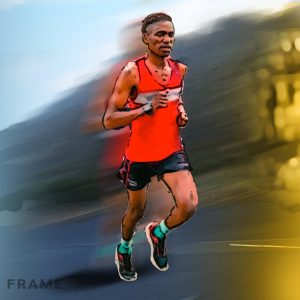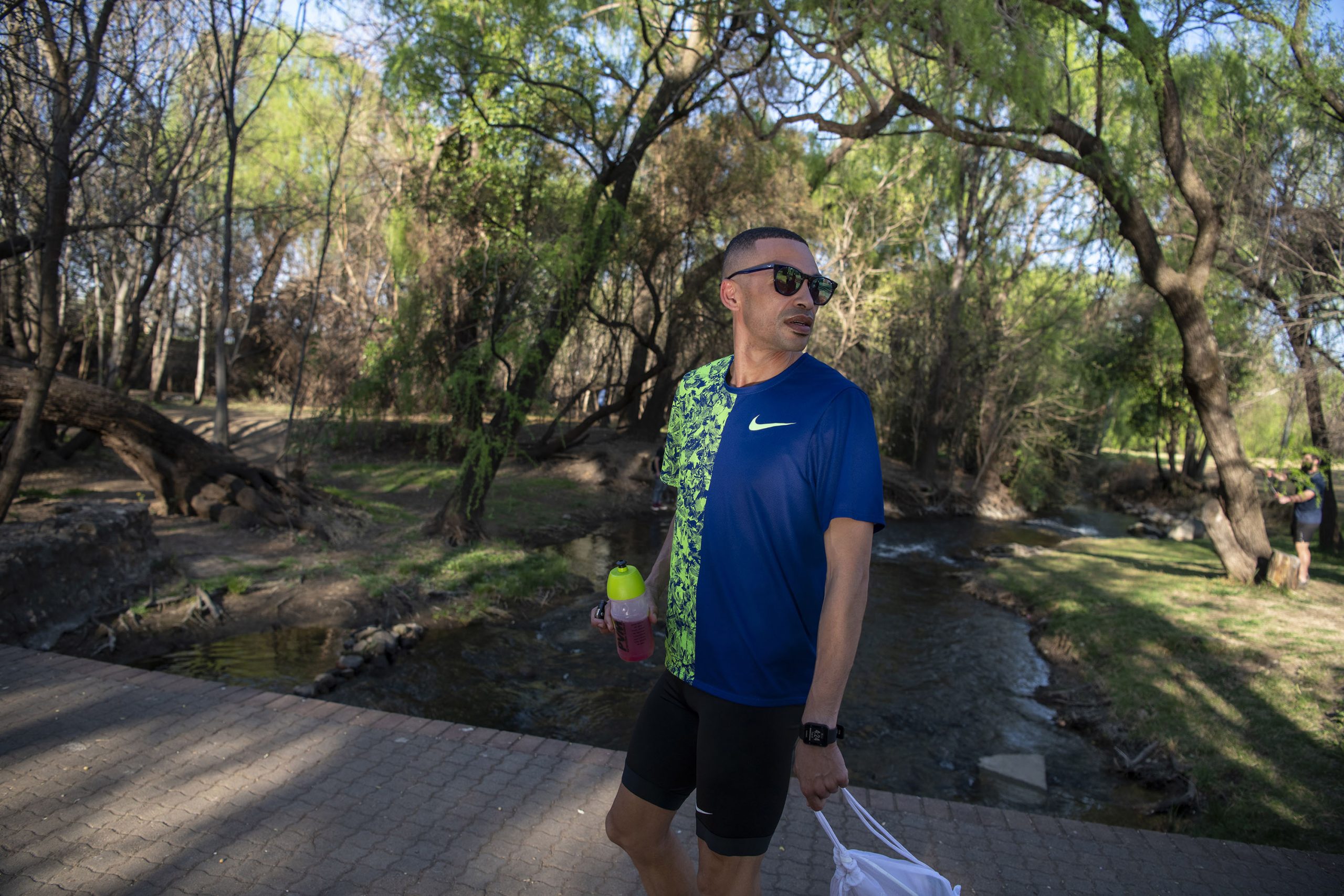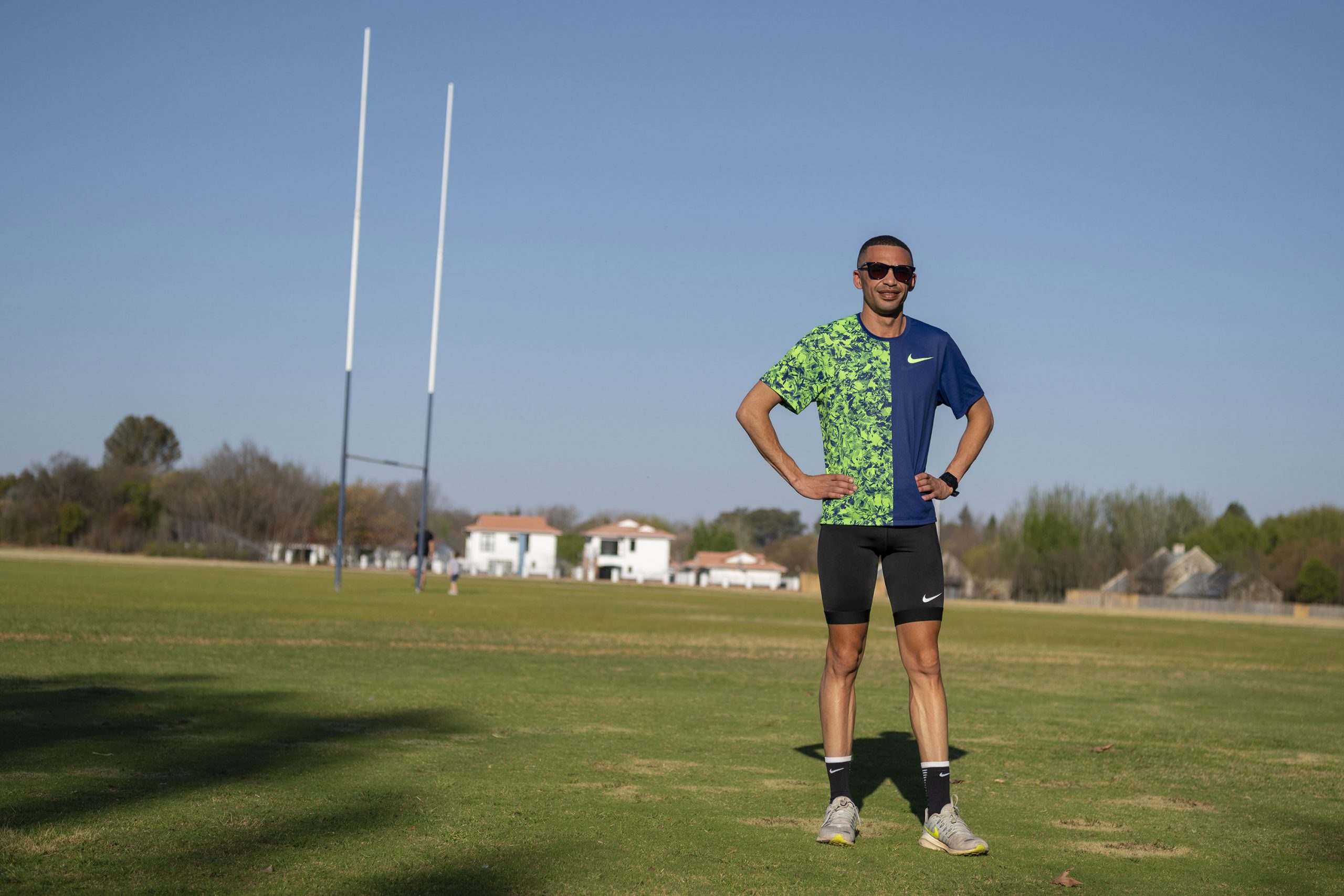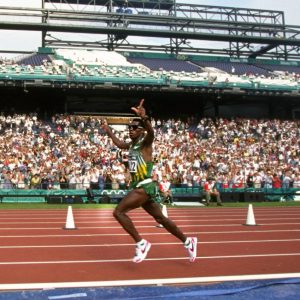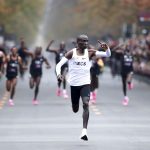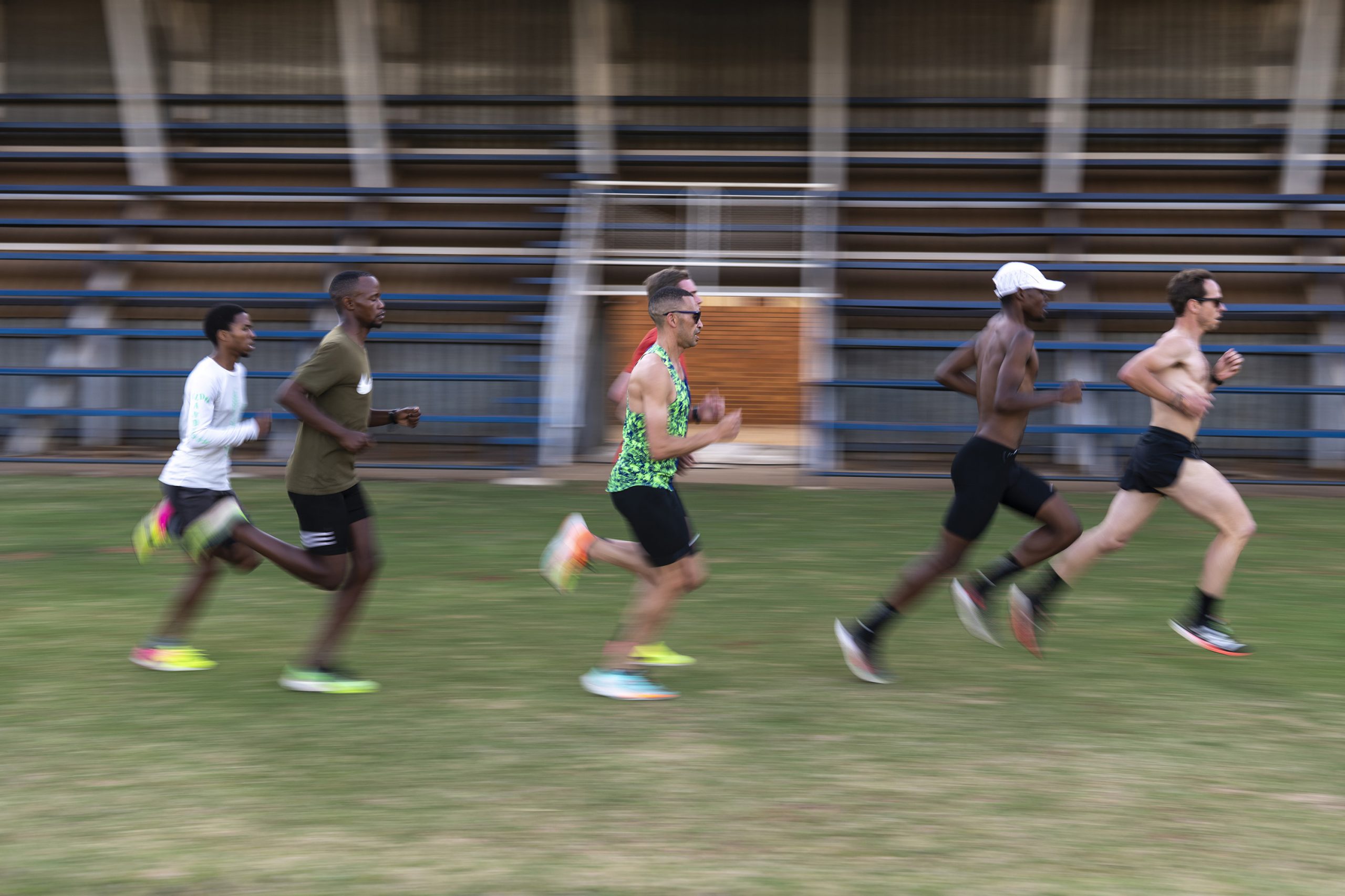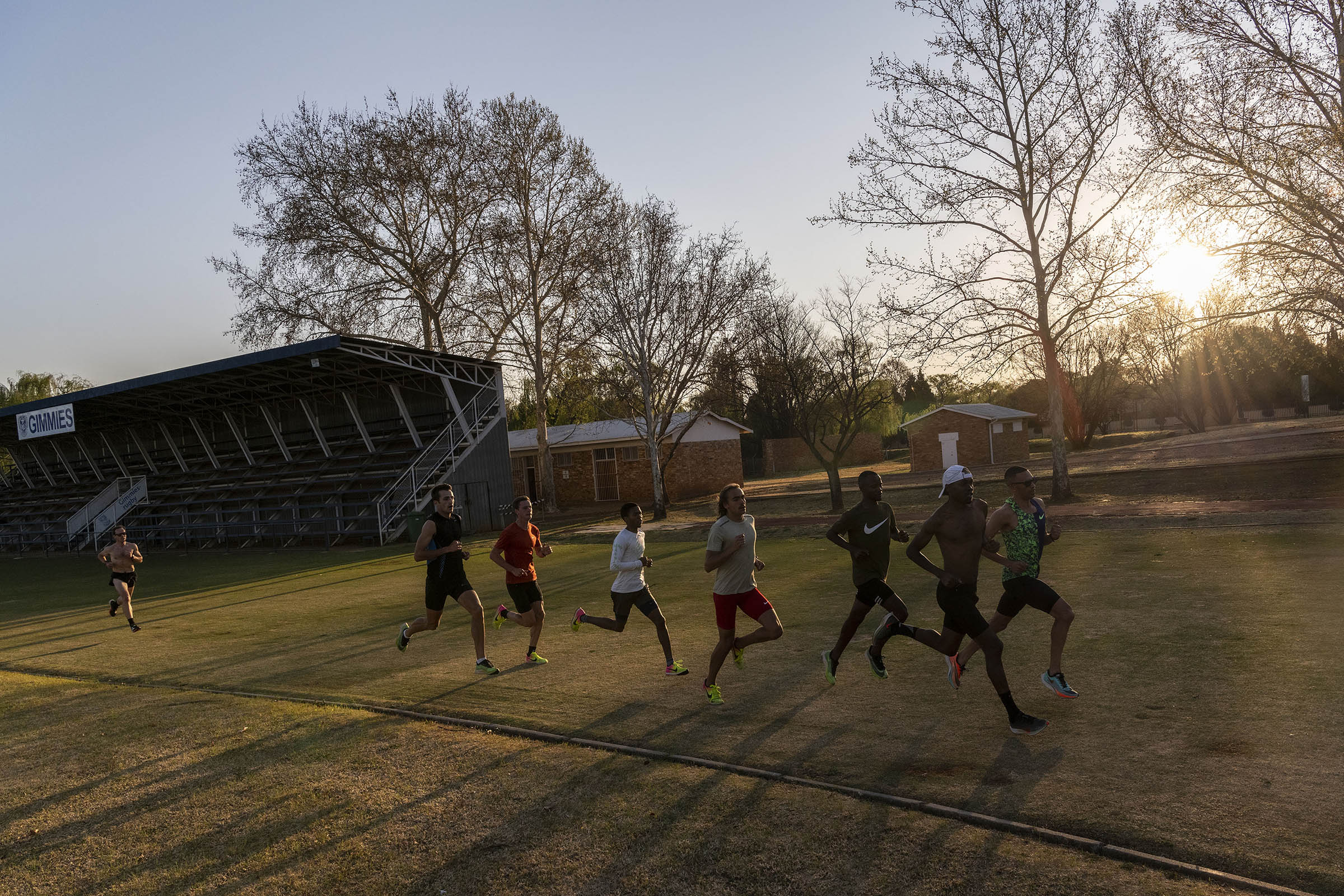Elroy Gelant’s thorn-strewn road to London Marathon
The South African marathon champion has had a number of inspirational role models in his career, from hometown champions in George to a South African great.
Author:
3 October 2020

Elroy Gelant walks out of his room resplendent in full Nike attire – black tights, a two-toned top, luminous blue and green. He is wearing grey trainers with black socks. All Nike.
He picks up a sling bag carrying another luminous pair of racers as we head out of the house. In the small yard – near the demolished braai area, which he is re-modelling – there are no less than five other pairs of the running shoes adorned with the world-famous swoosh.
He catches me staring at the shoes and smiles: “They [Nike] are my sponsor. I’ve used most of those,” he points to the shoes.
Used, however, is not the word many would pick to describe those running shoes that merely looked in need of a wash. But when you are a sponsored elite like Gelant, you hardly wear a pair for more than a month, if for a month at all.

It’s a long time and a different world since Gelant started running barefoot in Pacaltsdorp, George. And a long time since he had to run a particular time to earn hand-me-down spikes from a renowned athlete. Now, he is renowned himself, a former Olympics finalist and current national marathon champion. Such is his status that he will be among the elite few who will line up for the London Marathon on Sunday 4 October.
As he anticipated what he calls “a dream come true”, the 34-year-old could not help but reflect with glee on where it all began.
“Growing up in Pacaltsdorp, all I did was run. And I was fortunate because there were good structures in place. Within a week we would have a street mile, a relay and a cross-country race,” he tells me as we sit down for breakfast at Die Akker Koffiehuis in the heart of the university town of Potchefstroom, which he has called home for a little over a decade now.
Related article:
While just about every kid in his hometown ran back then, with no plan to take the sport on professionally or full-time, Gelant remembers the event that got him hooked on running.
“I was nine years old when I won a cross-country race at my primary school and was chosen to represent the South West District in a national competition in Witbank. I did well in that race. I ran barefoot and stepped on a doring [thorn]. I had never experienced that because we have no dorings in George. I was crying because of the pain, but I continued running. I was in third place and didn’t want to lose it. I got a bronze medal and I was a huge hero when I got back home because I was paraded at the school assembly. I was our school’s Sportsman of the Year. Everywhere I went, everyone spoke about how I brought home a medal from Witbank. I loved how all that adoration made me feel and I wanted it more.”
Inspired by a local hero, and then others
Immediately thereafter, the achievement of a homeboy got him to believe his dreams were not too far-fetched.
“In 1996, Donovan Wright, who is from Pacaltsdorp, finished 10th in the Comrades Marathon. He was the last man to get the gold medal and that was a big deal in our town. He had been a headboy at one of the high schools and his achievement was hugely celebrated. That also served as great encouragement for me.”
From then on, young Gelant got hooked on athletics and started finding heroes. “I started cutting out pictures of the likes of Shadrack Hoff, Hezekiel Sepeng and Mbulaeni Mulaudzi and pasting them on my bedroom wall and in scrapbooks. I watched the Engen Series [a national athletics event in the 1990s] on TV and I wanted to be like those guys.”

Gelant was later exposed to international races and immediately took a liking to Ethiopian’s Haile Gebrselassie.
After completing high school, Gelant enrolled at Potchefstroom University (now North-West University), where he was fortunate to train with one of his heroes: Sepeng.
“Hezekiel was still studying at Potch when I first got here, and it was such an honour to train with a world star who was competing in the Golden Leagues. He was a great star and we would ask him for his Mr Price shorts and he made us work for them.
“Once, I asked him for his spikes and he said he would only give them to me if I could run a 1:50 in the 800m. I did and he gave them to me. I was fortunate to train with him because he had a positive outlook on running. He was always very focused, even in training. He still plays a big role in my career because he is always available for me whenever I need advice, especially in terms of managing my career.”
Related article:
That Gelant went on to achieve great things on the track is generally known. He is the holder of the national 3 000m and 5 000m records. In 2016, he reached the 5 000m final at the Rio Olympics.
He has since transitioned to the road though, and while he has only run two marathons – the 2017 and 2019 Sanlam Cape Town Marathon – he is so highly rated that he will be racing against the man he admires, Eliud Kipchoge in London on 4 October. Kenenisa Bekele withdrew from the marathon on Friday 2 October due to an injury.
“It’s goosebumps stuff,” he says while we watch a recorded Bekele documentary at his home. This was after we’d done a 10km jog with some of his training partners from the university. “Every runner looks up to Kipchoge and Bekele, and to be in the same race as them in only my third marathon is a dream come true. I will probably ask to take pictures with them, but only at the end of the race,” he chuckles. “Before that, I am going to keep it professional. We are in competition. Of course, I am not going to try and race them. It’s going to be a very fast race and my main target is to improve on my PB [personal best] (2:10:31), the target is to run a 2:07.”
Preparing to face his idol

On this September Tuesday that I spent with him in Potchefstroom, Gelant was already tapering for the race, having done most of the hard work in the preceding months despite the Covid-19 lockdown.
“I’ve been doing long runs of 25km, 28km, 32km and 35km. I prefer to do a little less than the race distance because I want to avoid doing too much. For last year’s Cape Town Marathon, my goal was to run a 2:08 but I made a few mistakes, one of them overtraining, and I felt it late in the race. The last 5km I was very sluggish because I had trained like a Comrades guy, with a lot of junk mileage. I actually blew out at 32km and it took a lot of hard work to still be able to do the 2:10 that I did [to become South African marathon champion].”
And so, along with his coach Jean Verster, Gelant has trained sensibly for the London Marathon with a lot of speedwork.
On that Tuesday afternoon, he and his teammates did an awe-inducing speed interval session of 8 x 1 000m. All the runs were completed in under three minutes, with the last two smashed in 2:37 and 2:25.
Related article:
Manage to keep that kind of pace in London and the 2:07 is definitely going to happen. Gelant is delighted that the marathon will be run on a loop instead of the normal route because of the Covid-19 restrictions.
“The format of this race is right up my alley. We are going to do 19 laps of 2.1km with an extra 1 300m straight going to the finish line. I have always been a track specialist and it is much easier for me to keep my rhythm on the laps. So, I am confident I will do well in London.”
It’s a long way from running barefoot in Pacaltsdorp to traversing the streets of London in the latest Nike Vaporflys as one of the world’s leading marathoners. Elroy Gelant has just done it in style.

